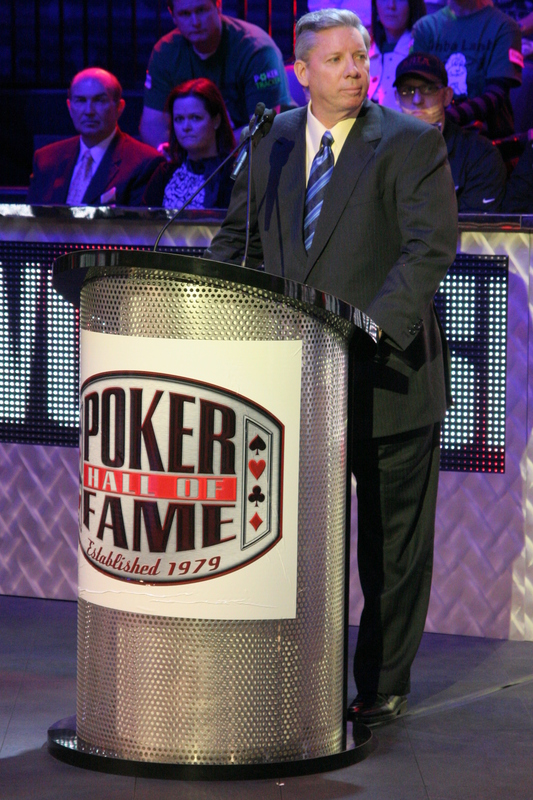






Bernard Lee: Fixing The Biggest Problem With The Poker Hall Of FameA Suggestion To Alleviate The Backlog Of Players Waiting To Be Inducted |
|
|

Mike Sexton emotionally summarized what it means to be a member of the Poker Hall of Fame during his 2009 induction speech. Created by Benny Binion in 1979, the Poker Hall of Fame currently has 60 members as of the start of the 2022 WSOP.
Although the first year of the Poker Hall of Fame saw seven initial inductees, there has never been more than two in a single year since that first class. From 2005 to 2019, two new members were announced annually (except in 2009 when Sexton was the sole inductee).
However, in 2020, the WSOP suddenly announced that it would be reducing the number to one new member per year. Last year, Eli Elezra was the only inductee of the accomplished list of 10 nominees.
Although the rationale behind this decision was to keep the Hall of Fame a more exclusive and privileged honor, this new restriction has also created a tremendous backlog issue. In fact, if the system is not revised soon, the Poker Hall of Fame will never rid itself of this congestion, and many deserving candidates will fall by the wayside.
Here are my thoughts and suggestions to potentially resolve this problem.
Current (and Future) Backlog
First, let’s review the specific criteria to be elected into the Poker Hall of Fame:
• A player must have played poker against acknowledged top competition
• Be a minimum of 40 years old at time of nomination
• Played for high stakes
• Played consistently well, gaining the respect of peers
• Stood the test of time
• Or, for non-players, contributed to the overall growth and success of the game of poker, with indelible positive and lasting results.
The 2022 Poker Hall of Fame nomination list includes (in alphabetical order) Josh Arieh, Layne Flack, Bertrand “ElkY” Grospellier, Kathy Liebert, Mike Matusow, Lon McEachern and Norman Chad, Michael Mizrachi, Brian Rast, Matt Savage, and Isai Scheinberg.
From 2016-2021, others who have been nominated include (in alphabetical order) Patrik Antonius, Humberto Brenes, Chris Bjorin, David Chiu, Antonio Esfandiari, Chris Ferguson, Bruno Fitoussi, Ted Forrest, Thor Hansen, and Max Pescatori.
Already with these 20 deserving nominees alone, we are looking at a significant backlog, not to mention the numerous players who have been unceremoniously forgotten over the years. But the major issue is that the Moneymaker Effect ushered in an unprecedented age of poker during the 2000s. With many of these players in their 20s at the time, several of them are now on the verge of turning 40 years old and being eligible.
 Just last year, Anthony Zinno and Brian Rast (nominated this year) both turned 40 and this year, John Monnette, Steve O’Dwyer, and Adam Friedman hit this milestone birthday.
Just last year, Anthony Zinno and Brian Rast (nominated this year) both turned 40 and this year, John Monnette, Steve O’Dwyer, and Adam Friedman hit this milestone birthday.
Now, let’s look at just some of the notable players that are coming down the pipeline and will turn 40 over the next five years. (If I left out any players from my list, I apologize.)
2023 – Maria Ho
2024 – Vanessa Selbst, Nick Schulman
2025 – Ben Lamb, Jason Koon, Justin Bonomo, Isaac Haxton, Phil Galfond, Scott Seiver
2026 – Jason Mercier, Tom Dwan, Shaun Deeb
2027 – Joe Cada, David Peters
And there is a couple dozen players on the fringe who could easily work their way into the discussion with a few more accolades. Even if you don’t agree with all of these names, that’s a lengthy list to pick just five players from.
Possible Solutions
First, the WSOP should strongly consider increasing the number of inductees voted in to at least two per year. In addition to these two people voted in via the voting process, I would propose an additional inductee chosen through a rotating committee system.
To borrow from another prestigious hall, the Baseball Hall of Fame has Era Committees (formerly Veterans Committees) that elect players who didn’t get in by vote. In 2010, the committee had three eras and started voting in players from the different eras in a three-year rotating cycle.
I would propose a similar rotating system where the following three groups would rotate selections every year. Each of these groups would establish a specific voting committee that would be apt to evaluate each specific group.
Players From Outside The United States
There is a disproportionate number of players in the Poker Hall of Fame from the United States. Of the 60 members, only nine are from outside of the United States. There are many deserving players from other countries, but they are often overlooked and not given the credit they deserve. If you look at the previous list of players who were nominated but fell off the list the following years, the majority of them are foreign players such as Patrik Antonius, Humberto Brenes, Chris Bjorin, David Chiu, Bruno Fitoussi, Thor Hansen, and Max Pescatori.
I would suggest that if they are not inducted after five nominations or turning age 55 (whichever comes first), they would be considered for this group.
Veterans (Over 55)
With the backlog, many players will be waiting for years before being selected. Inevitably, with the new crop of inductees coming along, some of these older players may fall off of the nomination list. Thus, I think this committee will help induct players that would have normally been inducted but maybe gotten pushed off the list due to the next generation of players.
Once again, I would suggest that if they are not inducted after five nominations or turning age 55 (whichever comes first), they would be considered for this group.
Contributors To The Game
With the Moneymaker Effect, the media coverage exploded and the innovations in poker increased as well. As the poker industry continues to develop, there will be more and more people that will have a lasting influence on the game beyond just the players.
In the coming years, there will be numerous deserving individuals in the media, tournament directors, poker tour founders, company owners, and influencers. The perfect example is Matt Savage, who has been nominated six of the last seven years and without question deserves to be inducted into the Poker Hall of Fame.
However, in the coming years, there will be debates about whether contributors deserve to get in over players. To help combat this, I would recommend an age requirement for a contributor. This age would be older than the current minimum age of 40, aka the “Chip Reese Rule,” based on how old he was when he was inducted.
Of all the contributors that have been inducted, the youngest were Linda Johnson at 58 and Mori Eskandani at 62. Once Matt Savage is inducted, there will be a new record age for contributor. Thus, I would recommend we establish the “Matt Savage Rule,” if and when he is inducted, establishing the minimum age for a contributor. (Note: Savage is 54 this year.)
One Big Year Of Inductions
Also, with next year being the 20th anniversary of Moneymaker’s win, the WSOP could consider adding a huge class to remove some of the backlog. To use prior precedence, they could consider inducting seven members like the inaugural year of 1979.
Then, I would suggest inducting one person from each group listed above during the first year this is implemented, beginning the three-year rotation for each group.
The WSOP could actually induct TEN total people in 2023 to help eliminate the backlog: seven players utilizing the current criteria and voting system (which would be similar to the inaugural year of the Poker Hall of Fame) and three additional people (one from each of the three rotating groups).
A Final Note
The current voting process only allows the current living members of the Poker Hall of Fame to vote on the nominees. In the past, well-respected members of the media were also allowed to vote as well. I would suggest bringing back the media vote.
For every Hall of Fame member, there should be a corresponding number of media votes. Currently, there are 32 living members. As the number of members inducted into the Poker Hall of Fame increases, so should the number of media votes to keep things balanced and avoid the living members from simply voting in their close friends each year.
I do hope that the PHOF will consider my suggestions of increasing the number of players inducted each year and also take a look at my three-year rotating system. Once again, if I left out any players from my list, I apologize. I do not mean to slight anyone as this column is meant to address the induction rules, not determine worthy candidates.
As poker continues to boom, the nominee list will continue to grow year after year, not only for players but for contributors as well. So many of these individuals will deserve to be inducted. It would be an utter shame to not induct people who truly deserve their rightful place in the Poker Hall of Fame.
 Bernard Lee broke into the poker world after a deep run in the 2005 WSOP main event. He has two WSOP Circuit rings, and is an author, having written for Card Player, the Boston Herald, Metrowest Daily News, and ESPN, where he was a host of the show The Inside Deal. His radio show and podcast, The Bernard Lee Poker Show, recently celebrated its 15th anniversary, and his latest book, Poker Satellite Success: Turn Affordable Buy-Ins Into Shots At Winning Millions, is now available on Amazon as well as D&B Publishing. Follow him on Twitter @BernardLeePoker or visit his website at BernardLeePoker.com or YouTube channel at Youtube.com/BernardLeePoker.
Bernard Lee broke into the poker world after a deep run in the 2005 WSOP main event. He has two WSOP Circuit rings, and is an author, having written for Card Player, the Boston Herald, Metrowest Daily News, and ESPN, where he was a host of the show The Inside Deal. His radio show and podcast, The Bernard Lee Poker Show, recently celebrated its 15th anniversary, and his latest book, Poker Satellite Success: Turn Affordable Buy-Ins Into Shots At Winning Millions, is now available on Amazon as well as D&B Publishing. Follow him on Twitter @BernardLeePoker or visit his website at BernardLeePoker.com or YouTube channel at Youtube.com/BernardLeePoker.
